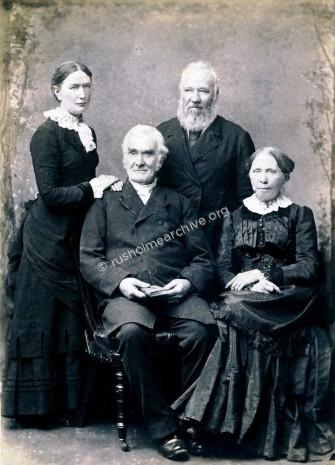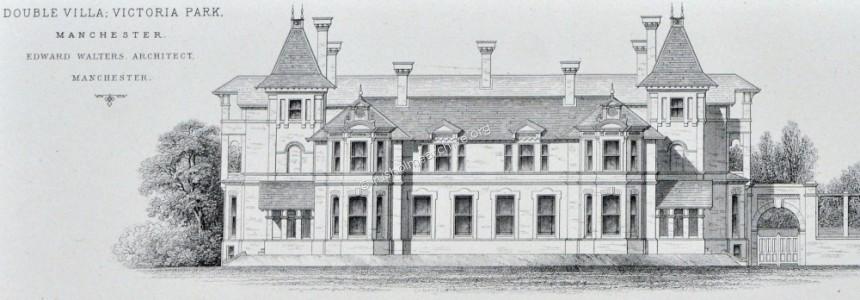Rusholme & Victoria Park Archive
Thomas Lowe 1815 - 1892
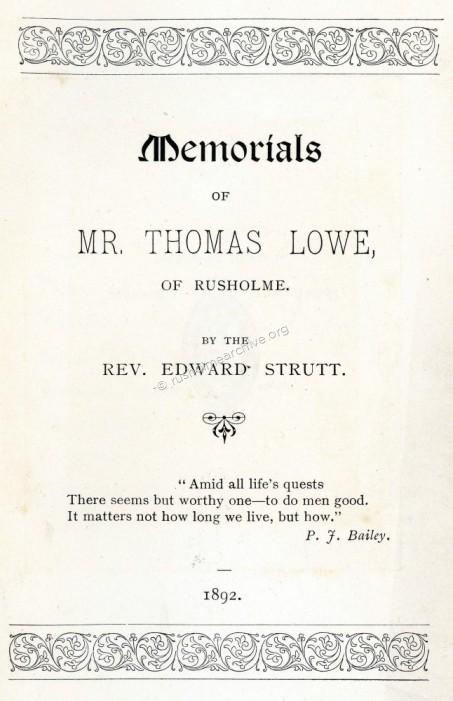
Thomas Lowe was born in a farming family at Wybunbury, Staffs in May 1815. He was the third of seven children, sadly his mother dying when he was only twelve. Thomas was brought up in a strong Methodist tradition and his education, albeit modest, had started when he was seven. The headmaster of the school was a Mr Pankhurst, whose grandson, Richard married Emmeline Goulden, forever famous as a leading suffragette.
In August, 1835, at the age of 20, Thomas joined two of his brothers who were working in a Manchester warehouse. They lived in Longsight, but later moved to Rusholme. Thomas Lowe was perhaps a good example of a simple but deeply committed Methodist, but his moving to the city must have been hard. The following two paragraphs are taken from the book;
“In August, 1835, Congleton was left for Manchester. It was a painful wrench to leave his spiritual birthplace and the dear companions of his religious life.
A Manchester warehouse has not always proved the best school for a young Christian. He saw the perils, and writes :—" I am now residing in the town of Manchester, a place where wickedness abounds: oh that I may have grace to stand in the evil day ! "
After two years in Longsight and Rusholme he returned to his father in Congleton, and in September, 1837, his name appeared on the plan of the Congleton Circuit as a local preacher on trial: Will Lowe shared this honour and also two other young men, one of whom, George Pedley, was a life-long friend. Once again the pillar of cloud moved, and Thomas Lowe came back to Rusholme on the 20th of April, 1839, to begin a practically unbroken residence of fifty-two years.”
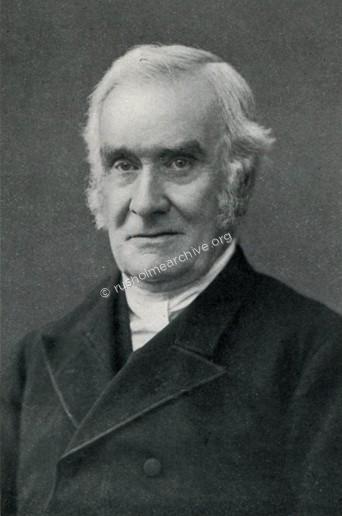
Thomas Lowe was married twice, in 1840 when he was 25, he married 21 year old Rachel Cottrell. They had five children: Alfred, Rachel, William, Thomas and John. Rachel died in 1859, aged 40. The following year in 1860, Thomas married Rachel’s younger sister, 33 year old Mary Ann Cottrell. They had three sons: George, James and Joseph. (Joseph settled in the Lake District where he achieved a reputation as a photographer & painter)
Thomas spent the last few years of his life at Birch Fold Cottage, Old Hall Lane, Fallowfield. The Cottrell family had lived there for at least 30 years, all of the women describing their occupation as 'laundress'. An advertisement in the Manchester Courier and Lancashire General Advertiser in 1890 had the following announcement:
Birch Fold Cottage, Old Hall Lane, Rusholme; Apartments for Gentlemen; detached cottage; large garden; pleasant rooms. Clearly the family made every effort earn a modest living, Thomas having had various jobs during his life, warehouseman, baker, flour dealer, market gardener, dairyman & milk dealer. He died there on 3 March 1892, aged 76. His estate was valued at £174.17 shillings.
The watercolour painting below of Birch Fold Cottage belongs to Charlotte Broadbent, a great, great granddaughter of Thomas Lowe; It had belonged to her mother who described it as the family home. Charlotte has now very kindly offered rusholmearchive the opportunity of displaying the watercolour. The watercolour is signed by E. Wilson, despite considerable searching I cannot find any details about the artist.
William Royle referred to Birch Fold Cottage as the oldest house in Rusholme, and where according to some local rumours Oliver Cromwell had once slept there! The cottage was finally demolished in 1911.
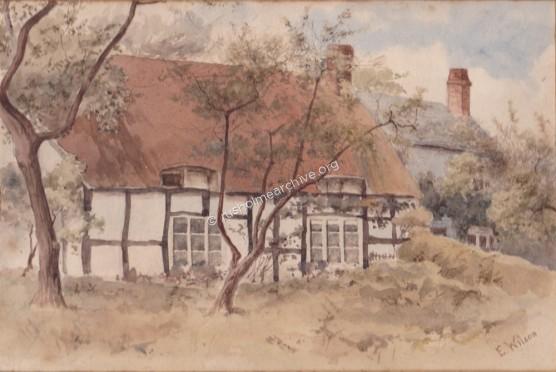
Three brothers of Thomas Lowe, (& later his father) emigrated to Australia, his younger brother Joseph having married another of the Cottrell sisters, Elizabeth. There are still descendants in the UK and Australia; if you want to explore more about the family genealogy follow the link below.
William Royle in his History of Rusholme referred to Thomas Lowe and said of him;
“Thomas Lowe, one of my best friends, was known to most people in Rusholme. He came to the village in 1836 and took part in most of the public affairs of the village. He was one of the founders of the Rusholme Public Hall in 1850 and also of the Working Men's Club in Nelson Street. He was the pioneer of temperance work and established the first teetotal society in the village in 1845 which held its meetings in the Chapel in Moor Street. He was an unflinching advocate of total abstinence, and some who to-day hold aloft the banner of temperance in Rusholme owe their inspiration to him. His public work in connection with the village was justly recognised when he was unanimously invited to occupy the chair at the Jubilee celebration in the Public Hall in 1887 and presided over a splendid meeting. A well read and cultured man he was never tired of talking about his favourite science, astronomy. As is well known he was the father of Wesleyan Methodism in Rusholme and passed away in 1892 at the ripe age of seventy-eight, having lived in Rusholme fifty-six years.”
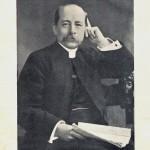 The 87 page biography of Thomas Lowe was written by the Rev. Edward Strutt, a Methodist minister who had worked for eleven years as a missionary in Ceylon before returning to England in 1887 because of ill-health. In 1890 he became the minister at the Oxford Road Chapel and stayed for three years – being so near to Rusholme clearly he must have have been well acquainted with Thomas Lowe, William Royle referred to Edward Strutt as;
The 87 page biography of Thomas Lowe was written by the Rev. Edward Strutt, a Methodist minister who had worked for eleven years as a missionary in Ceylon before returning to England in 1887 because of ill-health. In 1890 he became the minister at the Oxford Road Chapel and stayed for three years – being so near to Rusholme clearly he must have have been well acquainted with Thomas Lowe, William Royle referred to Edward Strutt as;
“The devout Edward Strutt, a man of blessed memory”
I should like to express my thanks to Peter Strutt who contacted me with information and the photograph, (click right) about his great-uncle, the Rev Edward Strutt. If you would like to read a more detailed page about Rev. Edward Strutt click here
To read this book click below and download the book, you will need Adobe software installed.
The photograph below is of Thomas, his second wife Mary, and standing is his daughter Rachel, (from his first marriage). The other man is unknown.
This photograph has been kindly provided by Paddy Neill, Thomas Lowe's great great grandson.
